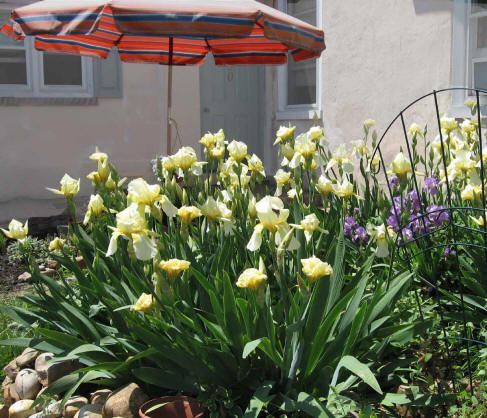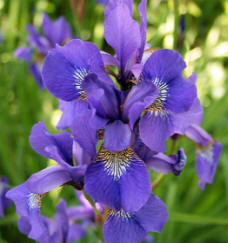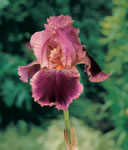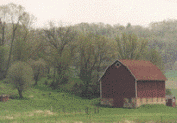|
Iris Flower Beds in Garden Landscaping
The name Iris
comes from the Latin and Greek where it relates to a
rainbow, and considering the existing 200 to 300 different species with their
variety of colors, it's easy to understand why.
Irises are largely grown as
ornamental
plants
with the bearded
German Iris being the most common. A variety of wild forms
and naturally occurring hybrids form the basis for most all
modern hybrid bearded iris. Many forms of bearded iris and
miniature tall bearded have been developed from crossing tall and dwarf varieties
They grow quite well in the
North Temperate Zone. (Presby
Memorial Iris Gardens in New Jersey is a living iris museum
with over 10,000 plants). |

Bearded irises are easy to cultivate and propagate, and very popular in gardens.
They grow in any good free garden soil, the smaller and more delicate
species needing only the aid of turf ingredients, either peat or
loam, to keep it light and open in texture. Some wild iris
thrive in
the rich soil of wooded areas.
The dwarf forms of Iris pumila are earliest to bloom and blossom during
March, April and May.
The larger 'tall bearded' varieties, such as
I.germanica,
florentina, pallida, variegata, amoena, flavescens, sambucina,
and their modern hybrids, bloom profusely from May
into June.

Some of the blossoms in my Iris Garden reached a height
of 4 1/2 feet! The bed is about 8 years old, faces South East
and is in a corner of the building protected from the bitter
cold North winds in the Winter.
The rhizomes are thinned every year after the blooms are gone and the
flower stems have dried. The species shown above with its soft
yellow hue was derived from an award winning hybrid
(Philadelphia Flower Show)
 True red tall bearded Iris remains an unattained goal of frequent hybrid-izing and selection. True red tall bearded Iris remains an unattained goal of frequent hybrid-izing and selection.
There are species and selections, most notably Iris fulva, which have a
relatively pure red color.
However, getting this color into a modern Iris breed has proven very
difficult, and thus the vast majority are blue iris and in the
purple range of the color spectrum. There are also black iris
and yellow iris flowers.
Some species bloom in the Spring and again in the
fall and are generally easy to raise.
Keeping the soil in your
Iris beds moist during the hot dry summer is important.
Iris beds make a great addition
around pools, ponds and water gardens, and for mass plantings.
They can also be used on difficult banks and for preventing erosion.
They make magnificent cut flowers and are resistant to deer.
What could be more perfect for landscaping?
Share with
your Gardening Friends if you Like This
Resources –
►How
to Grow Iris
|
Member
- American
Iris
Society
#97362
Region 3
Pennsylvania
and Delaware |
|
 1.
The Iris Spinn Off,
(Iris x germanica 'Spinn Off') is a fragrant reblooming
bearded iris that has magenta colored flowers with a rose
margin around the flower petals. With a velvety texture and
beautiful sword-shaped foliage, it has a plant height of
32”. Spinn Off blooms in the spring and then again in the
fall. It prefers average, well-drained soil. Spinn Off
prefers full sun, but will tolerate a little afternoon
shade. It will make a great addition around pools, ponds and
water gardens, and for mass plantings. 1.
The Iris Spinn Off,
(Iris x germanica 'Spinn Off') is a fragrant reblooming
bearded iris that has magenta colored flowers with a rose
margin around the flower petals. With a velvety texture and
beautiful sword-shaped foliage, it has a plant height of
32”. Spinn Off blooms in the spring and then again in the
fall. It prefers average, well-drained soil. Spinn Off
prefers full sun, but will tolerate a little afternoon
shade. It will make a great addition around pools, ponds and
water gardens, and for mass plantings.
More Exciting Iris Selections at The Nature Hills Nursery
HERE
 2.
At Sage Hill Farms,
organic herbs
grown by safe
and natural methods of farming produce healthier and
better tasting products and give the satisfaction of
giving something back to Mother Earth. From acres of
land to a small patio container garden, there is something
each of us can do to improve the earth
around us. 2.
At Sage Hill Farms,
organic herbs
grown by safe
and natural methods of farming produce healthier and
better tasting products and give the satisfaction of
giving something back to Mother Earth. From acres of
land to a small patio container garden, there is something
each of us can do to improve the earth
around us.
Subscribe to FREE Newsletter
and
receive herb gardening advice from the dedicated Sage Hill
Farm family.
Sage Hill Farms is in Petersburg, Tennessee, where
the Iris is the State Flower |
|
|
3. Creating
any new garden, or refreshing ones you may
already tend is a wonderful opportunity to set
your creativity on fire.
A complete Garden
catalog with high quality illustrations, like
the one you can get Free from
The Nature Hills
Nursery,
will give you many
exciting hours of planning your floral designs
and enjoyment during the growing seasons. |

CLICK IMAGE TO REQUEST CATALOG
of LIVE PLANTS, LIVE TREES, SHRUBS,
PERENNIALS, SEEDS and BULBS, ROSE BUSHES, and
MUCH MORE.
CHECK OUT THEIR GARDEN CENTER FOR MORE
DECORATING and DESIGN IDEAS |
|
|
|
To Top Landscaping Small
Gardens |
|
|
© RichardPresents.com All
Rights Reserved. Old School Bldg, RmD1, 230 Centre St, Langhorne, PA
19047 USA |